- Home
- Anne Zouroudi
The Doctor of Thessaly Page 2
The Doctor of Thessaly Read online
Page 2
But his conscience pricked; so, riding as slowly as he could, he whispered his apologies to the saint, and making several crosses over his heart, promised he would visit her tomorrow.
He changed gear and, accelerating, prepared to ride by.
But St Paraskevi, it seemed, rejected his excuses. High over the courtyard wall flew a missile, which, missing his head by very little, landed heavily on the track ahead of him.
Startled, Adonis braked, the scooter sputtering gravel as he did so; but the scooter’s brakes were as poor as its tyres were bald, and before he came to a stop, the missile was behind him. He had, however, seen the object clearly. The saint had tried to hit him with a shoe.
Switching off the engine, he pulled the scooter back on to its stand and walked the few paces to where the shoe lay. Cautiously, he bent to pick it up. It was a man’s shoe, well worn and unremarkable, except for a few splashes of white on the brown leather, like spilt milk. Frowning, he turned it over, wondering at its message; but as he did so, a hoarse voice called from inside the chapel courtyard.
‘Help!’
Holding the shoe before him, Adonis crept to the courtyard wall, stepping up as close to it as the sharp-thorned thistles allowed. He listened. The shout was not repeated, but, above the rustling of the wind in the grass and the rattle of bells from his nearby flock, a voice was muttering. He strained to catch the words, but the language was not Greek, and he understood nothing of its meaning. The speaker’s misery, though, was plain, and, still hidden safe behind the wall, Adonis dared to call out.
‘Is anyone there?’
The muttering stopped.
‘Here!’ called the voice. ‘I’m here! Hurry!’
The chapel gate was closed. Reaching in through the ornate ironwork, Adonis found the bolt, wriggled it back and stepped over the threshold.
The chapel showed the past winter’s neglect, with storm-blown leaves and pine needles unswept amongst dirt and lime-shards flaked from the walls. Untouched as yet by the rising sun, the courtyard shadows were dark, and the place was chilled from the fall of recent rain.
Between chapel and wall, a man lay quite still on a stone bench, covering his eyes with the flat of his hand. His plump belly rose up above his trousers. One of his feet was missing a shoe.
‘Are you there?’
The man’s voice was rasping, as if his throat were sore; as he spoke, his hand remained over his eyes. In curiosity, Adonis approached him.
‘Kyrie? Kyrie, are you all right? Do you need a doctor? I have my scooter. I think I could find the doctor.’
A sad smile touched the man’s mouth.
‘Am I so changed, then?’ he asked. ‘Friend, I am the doctor.’
Adonis looked again at the man, considering his stature and his clothing.
‘I knew straight away it was you, kyrie,’ he lied; and then, anxious not to give offence, he corrected his form of address. ‘Forgive me. Yiatre.’
‘Who are you?’ asked the doctor. His Greek was excellent, but his accent was a foreigner’s, with the strange pronunciation of northern countries. ‘What’s your name?’
‘Adonis. They call me Adonis Anapodos.’
‘Then I know you, by sight.’ The doctor gave a bitter laugh. ‘By memory, now. Listen to me, Adonis. You must fetch me some water. As quick as you can, fetch plenty of water.’
Adonis placed the shoe by the doctor’s stockinged foot.
‘Gladly,’ he said. ‘Right away.’
On the far side of the chapel, outside the old refectory and kitchen, an aluminium pail strung on rope stood on the well wall. As he raised the well’s iron cover, the hinges squealed with lack of use; once opened, a smell of ferns and water rose from far below.
Adonis lowered the bucket, flicking the rope as the pail touched the water’s surface, tilting it so it would fill; hauling it heavy from the well, he stood it on the wall, and considered the problem of how to take the water to the doctor. The bucket was tied to the cover-hinge, and the knot was complex, and tight; without a knife to cut the rope, the bucket could not be freed.
He looked around. The door to the kitchen was behind him. Clicking open the latch, he went inside.
The kitchen was dank, and musty; heavy cobwebs covered the small window, obscuring the light. Adonis sniffed. He knew this room. If bad weather ever caught him, he took shelter here, and often in summer he refilled his bottle at the well, and sat a while at the table to drink where it was cool – and today, beneath the faint and usual scents of old woodsmoke and incense, there was something unusual.
The long, pine table – dulled with the bleach and scrubbing of zealous women – held scores of plates and cups and the great fire-blackened pans for boiling and frying on feast days. Today, alongside them was a tartan-patterned Thermos flask, its cracked cup standing beside it. Picking up the flask, Adonis opened it, and the out-of-place smell, the scent of coffee, intensified. He glanced into the cup, which, though empty, had been recently used, and, anxious to be tidy in St Paraskevi’s house, replaced the cup over the flask’s cap.
Below the window, mounted on plinths of bricks, was a stone trough drilled through to drain water, and under the drain-hole stood a yellow bucket. He took the bucket, and a china cup from the table, and at the well filled the yellow bucket from the metal pail.
Returning to where the doctor lay, he found him exactly the same, his eyes still covered.
‘Are you there?’ asked the doctor, uncertainly. His voice was weak. ‘I shouted for hours, but no one came.’
‘I’m here,’ said Adonis. ‘I got water. And a cup.’ He dipped the cup into the water; but as he did so, the doctor waved it away with his free hand.
‘My eyes,’ he said. ‘The water’s for my eyes.’ Slowly, he raised himself to sit. ‘Put my hand to it. Show me where it is.’
Adonis placed the bucket by the doctor’s feet, and guided his free hand to its rim.
‘Here, yiatre,’ he said. ‘It’s here. I can fetch more, if you need it.’
‘It hurts to bend,’ said the doctor. ‘Better put it up here.’ He patted the stone bench beside him, and Adonis lifted up the bucket, placing the doctor’s hand on its rim once again.
‘Hold it steady,’ said the doctor.
He put his free hand in the water, and, taking the other at last from his eyes, placed it too in the bucket.
Astonished, Adonis stared at the doctor’s face. His eyes were milky pale and featureless, with no distinction between white and iris, or iris and pupil, as if some artist had rubbed out their drawn-in details; the skin of his lids and below his eyes was raw and red, wet and weeping. The bridge of his nose, the low part of his brow and his cheekbones seemed to have no skin at all, as if someone had held a blow-torch to his face – except for his eyes, which seemed, in their whiteness, frozen.
In shock, Adonis crossed himself.
‘Yiatre,’ he said. ‘Panayia mou.’
The doctor turned his face towards Adonis, and his eyes – like stone, like marble – seemed as compelling and beguiling as the damning eyes of Medusa.
Adonis shuddered.
‘Is it bad?’ asked the doctor.
Adonis, confounded, was reluctant to give his honest opinion.
‘What do you mean, yiatre?’ he asked, cautiously.
‘My face,’ said the doctor. ‘Is it bad?’
Adonis moved close to the doctor, and, fighting his revulsion, studied his face, rocking his own head from side to side as he considered.
‘Quite bad, in places,’ he said, truthfully. ‘In others, not so bad.’
The doctor turned his stone eyes away, and Adonis was glad. Bending his head, filling his cupped hands from the bucket, the doctor lowered his face to the water; as the water dribbled back into the bucket, he scooped out more, tenderly bathing his eyes and his damaged skin.
After a while, he stopped.
‘The pain is bad,’ he said. ‘Do you see my bag?’
Adonis looked about them.
There was no bag.
‘No,’ he said. ‘It isn’t here.’
‘He took it, then.’
‘Who, yiatre?’
‘Whoever did this to me. Still, there’ll be something in the saddlebag. I want you to go to my motorbike . . .’
‘There’s no motorbike,’ interrupted Adonis. ‘Only my scooter.’
‘It must be there,’ insisted the doctor. ‘I didn’t hear it go. Go and look for my bike, and bring me whatever you find in the saddlebag. And hurry – though it makes little difference now, how fast we are. The damage is all done.’
He bent again to bathe his face. Adonis hurried through the chapel gate to where his scooter stood on the track, and looked around. Behind the chapel, where the land began its descent down to the plain, the weeds and grasses had been flattened into an indistinct trail around the outer wall. There, thrown on its side, lay a silver motorbike, and dropped on top of it, a black leather bag. Adonis grabbed the bag, and ran back to the doctor.
‘I’ve got your bag,’ he said. ‘Your bike is round the back. It’s fallen over. I think it might be broken.’
‘Open the bag,’ said the doctor.
Adonis did so, revealing inside a confusion of objects he didn’t recognise: a stethoscope, paper-wrapped packets, strange scissors, needles and thread.
‘Look at the bottom,’ said the doctor. His face was wet; his stone eyes stared ahead. ‘You’ll find syringes. I need one of those. You can read, can’t you?’
Adonis hesitated.
‘Not well, yiatre,’ he said. ‘I didn’t spend long at school.’
‘You must find me some vials – little bottles, Adonis – that hold liquid the colour of honey. There are some in there that look like water. Not those. Find me the honey-coloured bottles. Take your time.’
Adonis hunted carefully through the bag. The doctor sat, apparently calm; but his fingers held each other tightly, and he pressed his thumbs together, as if this helped him to control the pain.
‘I’ve found them.’
‘Good lad, good lad. Now listen to me very carefully; you’ll need to do everything just as I tell you.’
As Adonis prepared the injection, the doctor rolled up his sleeve to expose his upper arm, and when Adonis was ready, he pointed to a spot in the crook of his elbow. Before sinking the needle into the flesh, Adonis offered a prayer to St Paraskevi. As the needle went in, the doctor flinched.
‘Press the plunger slowly, Adonis,’ he said, ‘and then we’re done.’
As Adonis withdrew the needle, the doctor’s red eyelids closed over his marble eyes. For a time, he was silent.
‘Better,’ he said, at last. ‘Much better. Now, are you a good driver on that scooter of yours?’
‘I think so, yiatre.’
‘Then you must take me down to the town, somewhere they have a phone. When we get there, you must tell them that I need an ambulance urgently. Can you do that?’
‘Gladly, yiatre.’
‘Good lad, good lad. First take my bag, and hide it with my motorbike. We’ll send someone to fetch them in due course. When you’ve done that, come and take my hand. You’ll have to lead the way; you have the only pair of eyes to see where we are going.’
Three
Evangelia’s constant boast was that she never cut her hair, but this was a lie. On the first day of every second month, she used the dressmaking shears to trim the ends, to a line as straight as possible above her buttocks.
This morning, she rose within ten minutes of the alarm clock’s ring, and sat before the mirror to count one hundred brushstrokes. With them complete, her hair was sleek and straight, and twisting it at the base of her skull, she secured it with sharp pins in a tight knot. From a jar whose label showed a long-stemmed rose, she rubbed rose-scented cream into her face, concentrating on the crow’s-feet around her eyes and the slack skin of her neck. Picking up a gold-cased lipstick, she applied red to her lips, baring her bad teeth to the mirror to check for smears. She’d done the best she could; still her reflection was disheartening. Teasing matted, grey hair from its bristles, she laid the brush back on the dusty dressing table, in its place between the hand-mirror and the comb. There seemed to be too much hair in her hand, and she leaned towards the mirror, touching the bald place above her temple uneasily, but to her relief, it had grown no larger.
Loneliness had led her into unconventional habits: muttering her thoughts as she left the chair, she unfastened the window over the outhouse roof to drop the hair lost to the brush on to the tiles. She thought the birds might draw its strands to build their nests; but month after month, year after year, the birds never came.
She turned out the bedroom light. As she made her way downstairs to the kafenion, her breath was laboured and wheezing.
The shutters were closed, and the kafenion was dark. A tap dripped water into the porcelain sink. Groping for a socket, she threw its switch, and the glass-fronted fridge began to hum, though its light flickered on and off until she thumped its side, rattling the bottles of beer and retsina on its shelves. Overnight, as usual, a pool of water had formed around the base, and something, somewhere, smelled rancid.
In a cage hanging over the counter’s end, Mimi the cockatoo was silent. Evangelia tugged at a corner of the cage’s covering shawl, and the white bird slowly withdrew her head from beneath her wing, blinking as the sulphur-yellow feathers on her head rose in a crest.
Evangelia poked a fingertip through the cage bars, waggling it to attract the bird’s attention.
‘Kali mera sou,’ she said. ‘Kali mera, Mimi. Say “Mimi”, agapi mou. Wish your mama a kali mera.’
But the bird was nervous, and turned away her head, edging her clawed feet along its perch.
Evangelia held the shawl up high, matching corner to corner to fold it. Worked by gypsies, its embroidered peonies were bright on the antique silk, but the fringe was loose and uneven, and there was a bad tear on one edge. For a moment, she swayed her hips, thinking of the days she had worn it dancing. There was no dancing now; the memories were sweet, the present bitter, and, disheartened, she dropped the shawl unfolded on a chair.
Crossing heavy-footed to the windows, she swung back the left-hand shutters, letting the early daylight brighten the room. Lifting the bar from the door, she turned the iron key and kicked the wooden door-stop into place. At the right-hand window, as the shutters opened, the crown of a man’s head showed above the sill.
A stranger was waiting.
She took the unwashed ashtrays from the shelf, and went outside.
At his table, the fat man was writing a postcard. A paper bag held a collection of local views – the precarious monasteries at Meteora, a headless statue of Artemis, the snow-covered peaks of Mount Olympus – but the card he had chosen showed a donkey in a hat. His handwriting was small, but very clear, the letters carefully printed so a child could read them.
As Evangelia approached, the fat man laid down his fountain pen, and smiled.
‘Kali mera,’ he said.
Evangelia returned his smile, in a way that she intended to be winning.
‘Kali mera sas,’ she said. ‘What can I get you?’
‘Greek coffee, no sugar, if you please,’ said the fat man. ‘In fact, make it a double. I was here well before dawn, and I’ve had little sleep.’
‘I never open before seven,’ she said, as if he had offered a criticism. ‘There’s no call for coffee here, before seven.’
She laid an ashtray on his table, and turned away to distribute the rest. He watched her bend to reach the furthest tables, the hem of her shift-dress lifting to show the heavy thighs above her stocking tops; as her foot came off the ground to reach still further, he saw the hole worn through the sole of her fur-trimmed slipper.
The butts of three cigarettes he had already smoked were ground out by his feet, and he picked them up and placed them in the ashtray. As she made coffee, he signed his name on the postcard he was writing, and, replacing the gold-trimmed
cap, tucked the pen into the inside of his jacket. He slipped the written postcard back into the paper bag, and covering a yawn with his hand, looked around the square. Between the lamp-posts, blue-and-white bunting – triangles of the national flag – flapped in the breeze. Around a fountain so new the builders’ shovels still leaned against its basin, tubs of young plants were coming into flower. Inside the kafenion, over the clatter of crockery and spoons, he heard Evangelia swear and the slap of her hand on the counter; a young cat with a chicken neck in its mouth slunk out, and away.
When Evangelia brought the fat man’s coffee, she took a chair beside him at the table. Across the square, a red-eyed grocer carried out a box of oranges, and dropped it on a bench at the store front. Ripping a flap from the box, he took a marker from behind his ear, and wrote ‘800dr’ on the cardboard; laying the price on the fruit, he went back inside the shop.
‘That’s 50 drachmas more than yesterday,’ said Evangelia. ‘The older his stock is, the more expensive it gets.’ She eyed the postcards in their paper bag. ‘You’re a tourist, are you, kyrie? You’ve wandered off the usual track, to be touring here.’
The fat man held out his hand.
‘Forgive me,’ he said. ‘I haven’t introduced myself. I am Hermes Diaktoros, of Athens.’
She didn’t take the fat man’s hand, but watched as the grocer dropped a crate of cauliflowers beside the oranges. Kneading a shoulder as if it pained him, he sighed, and disappeared again through the shop doorway.
‘Three days old, those cauliflowers are now,’ said Evangelia. ‘Whoever does he expect to buy them? You’re a long way from home, if you’re from Athens. Is your family not with you? Where’s your wife?’
‘My travelling is all business, not pleasure,’ said the fat man. ‘And I never married. But I’m writing to my family. My grandson likes to know where I have been.’
At the implication of children outside marriage, she pursed her lips in disapproval, but the fat man took no notice.
‘I spend too long away,’ he said. ‘The little ones change so quickly. But there’s always business to attend to.’

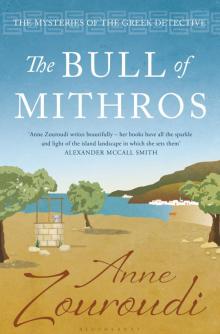 The Bull of Mithros
The Bull of Mithros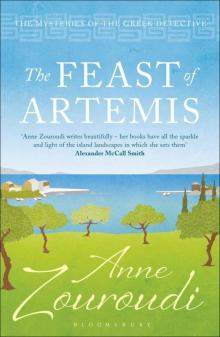 The Feast of Artemis (Mysteries of/Greek Detective 7)
The Feast of Artemis (Mysteries of/Greek Detective 7)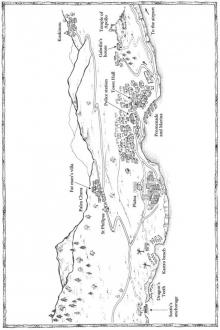 The Taint of Midas
The Taint of Midas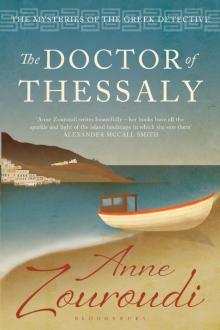 The Doctor of Thessaly
The Doctor of Thessaly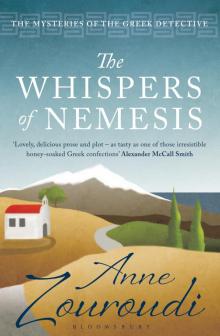 The Whispers of Nemesis
The Whispers of Nemesis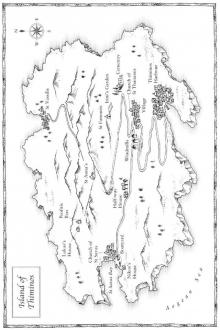 The Messenger of Athens
The Messenger of Athens